Training the logical thinking competency for pedagogical students via teaching Marxist – Leninist philosophy
Logical thinking is essential competency for pedagogical students for learning,
teaching as well as researching science. It helps learners to recognize the keys of problems
in order to present as well as solve these problems in a scientific, reasonable and effective
way. Not only that, this competency is one of the components of pedagogical competence,
which helps pedagogical students having an effective teaching method in the future. This
article focus on analyzing the role of Marxist – Leninist philosophy in fostering the capacity
of logical thinking for pedagogical students, on that basis, offering some solutions to improve
the logical thinking competency for learners via teaching Marxist – Leninist philosophy.
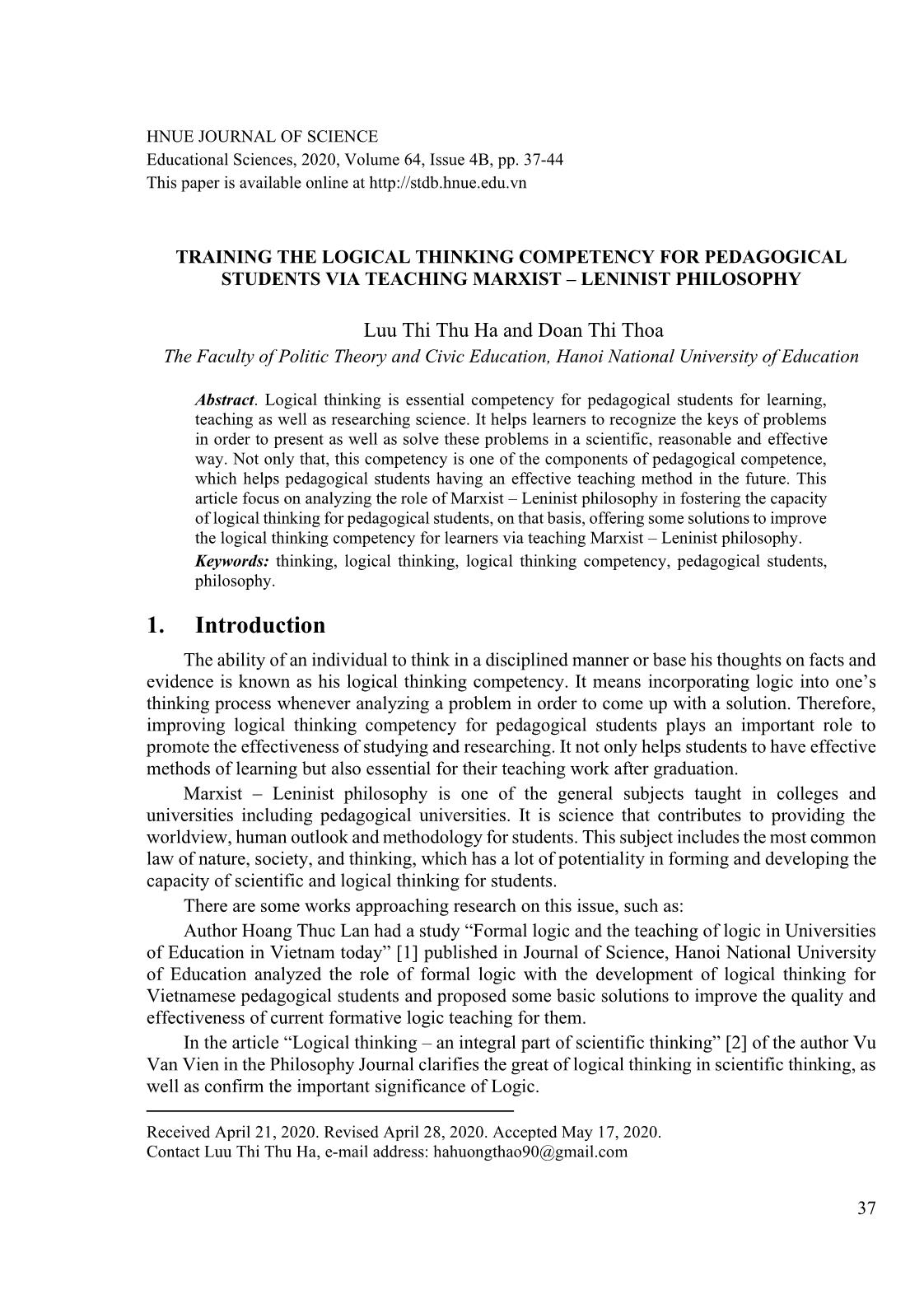
Trang 1
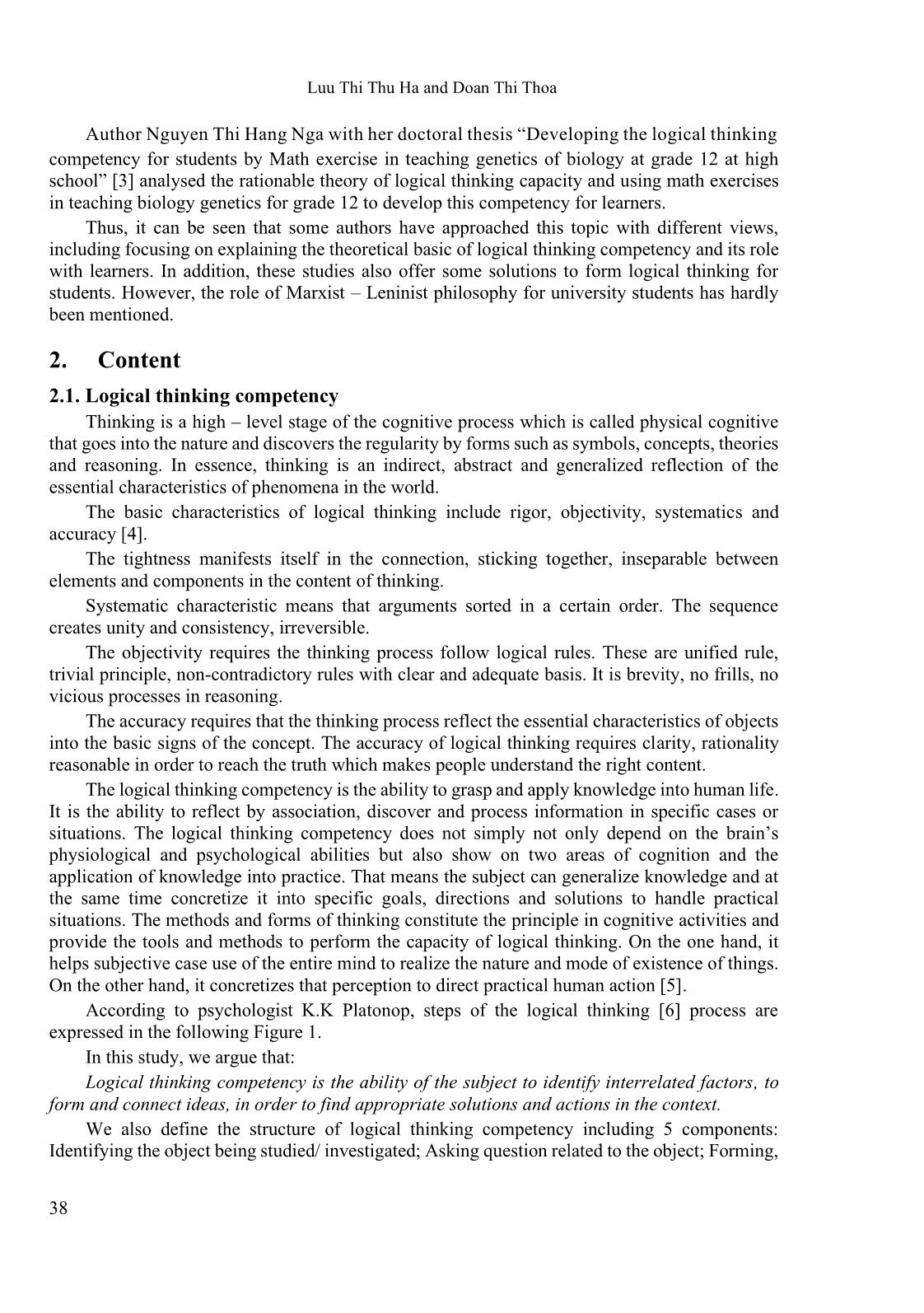
Trang 2
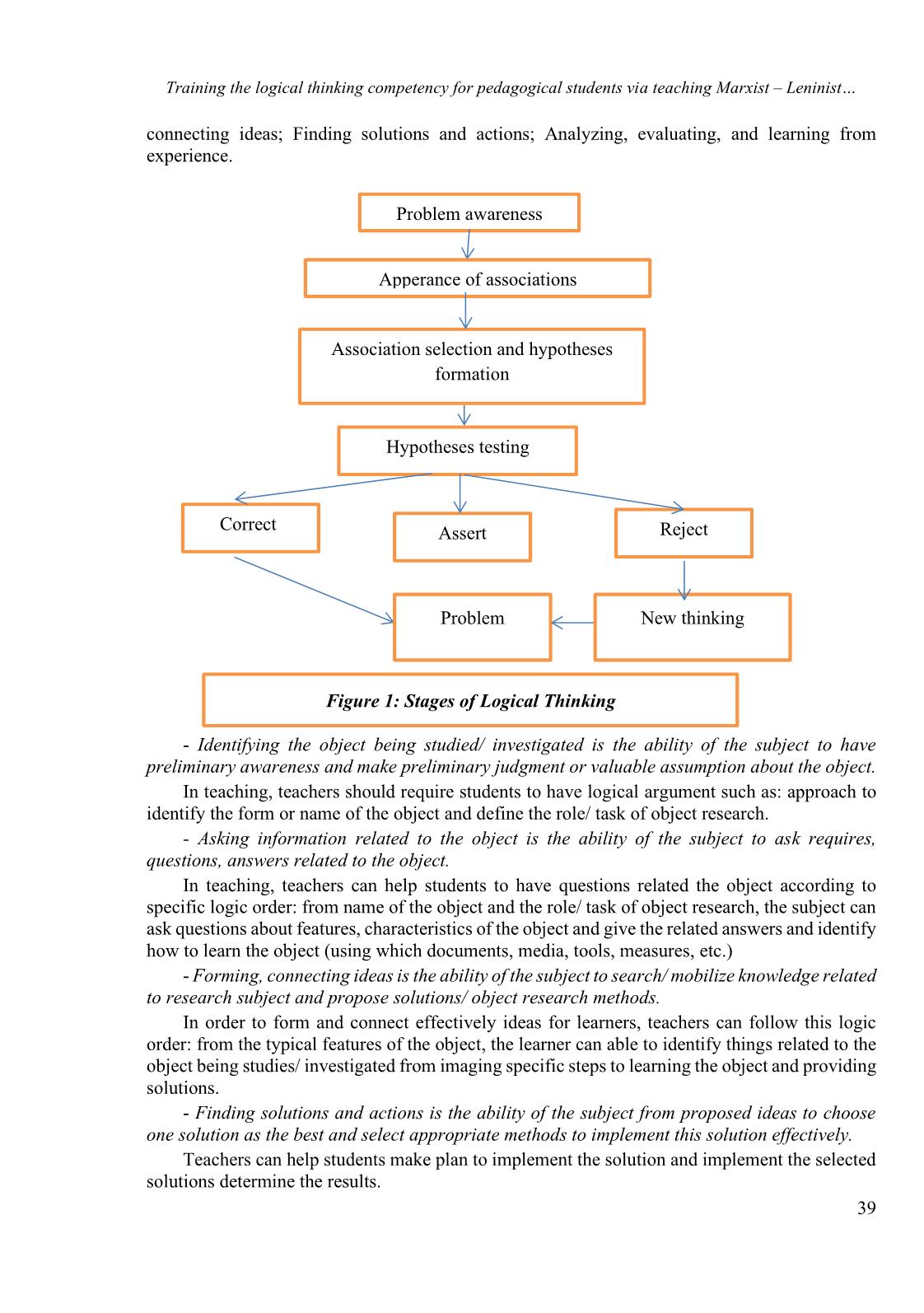
Trang 3
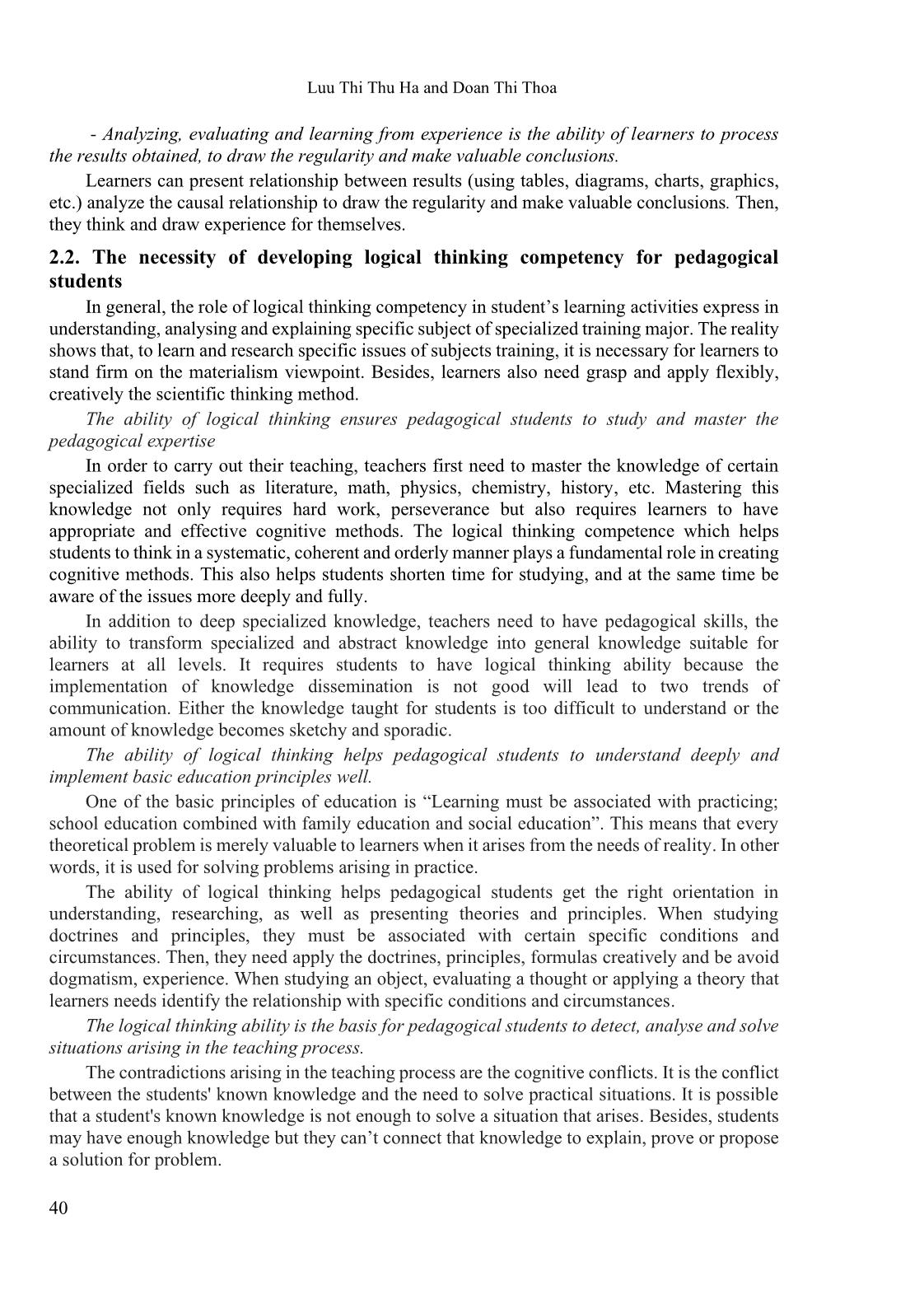
Trang 4
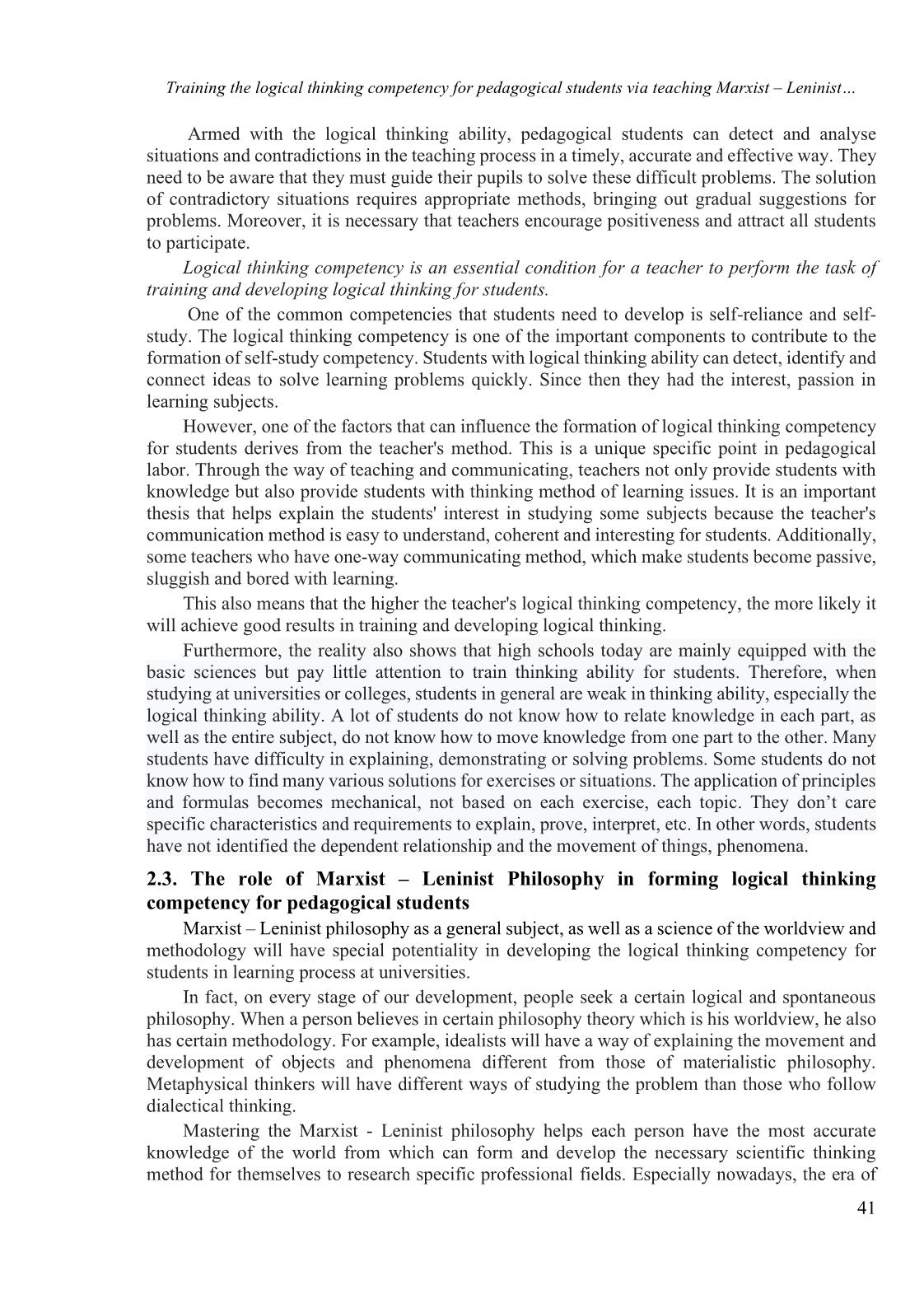
Trang 5
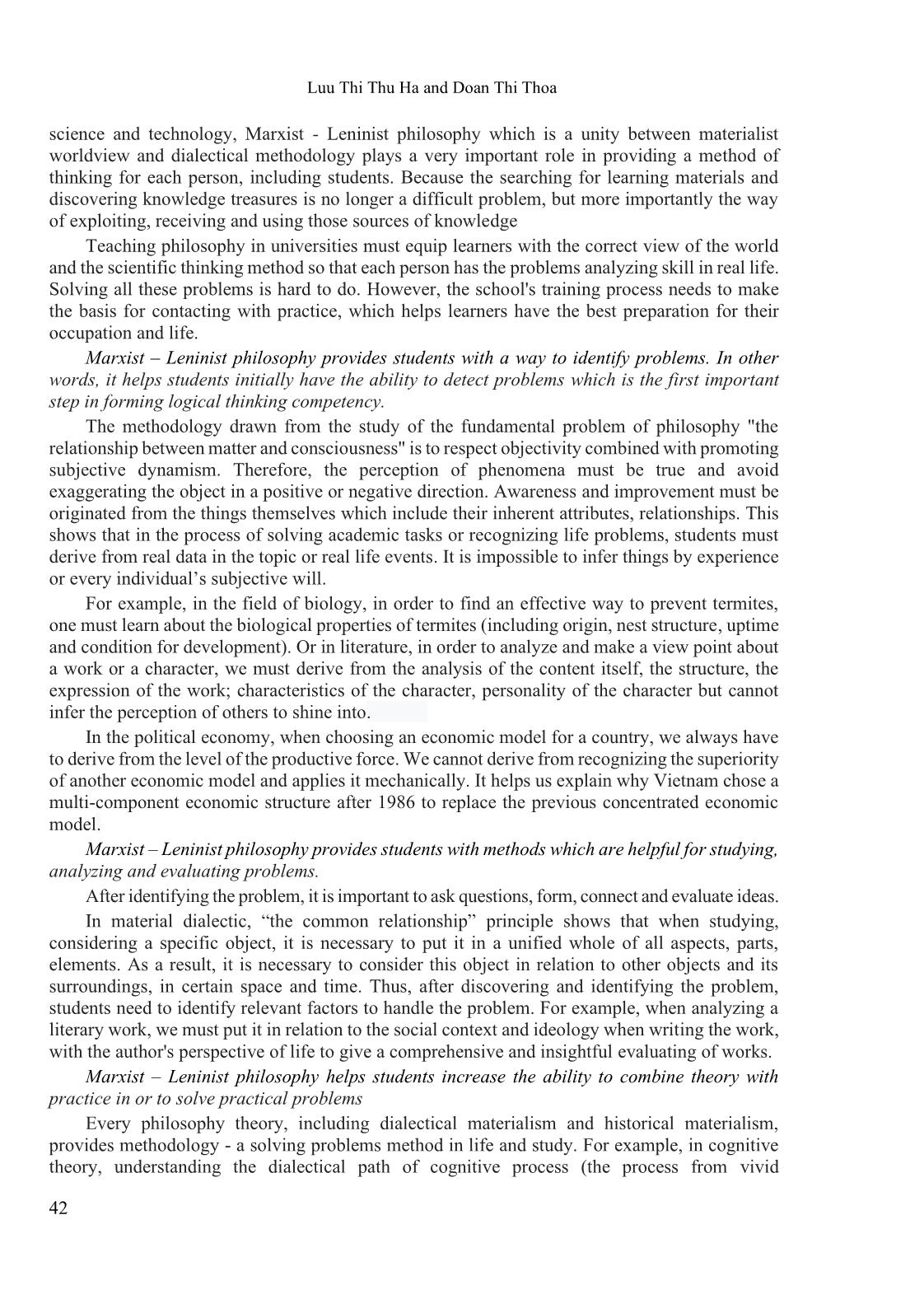
Trang 6
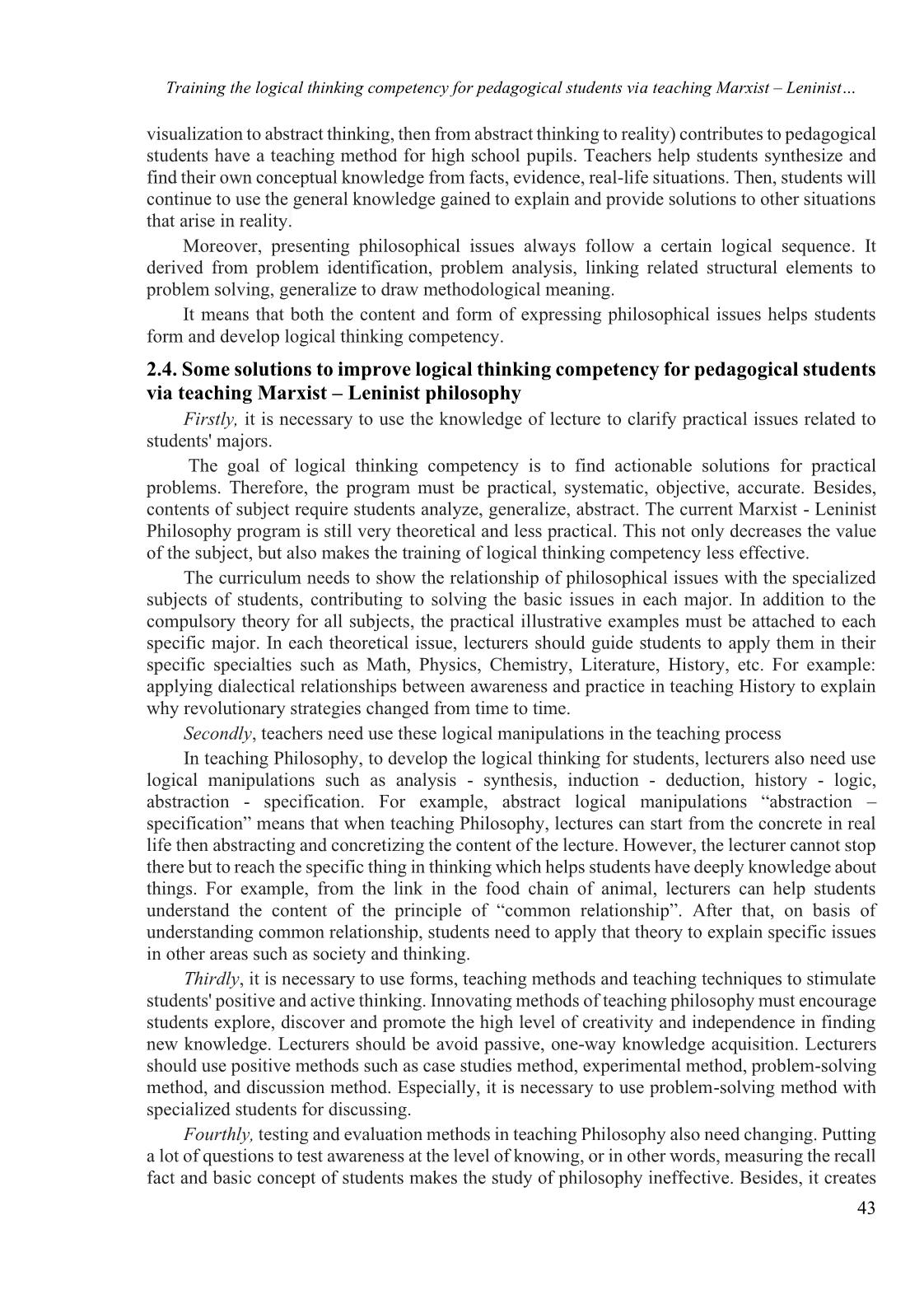
Trang 7
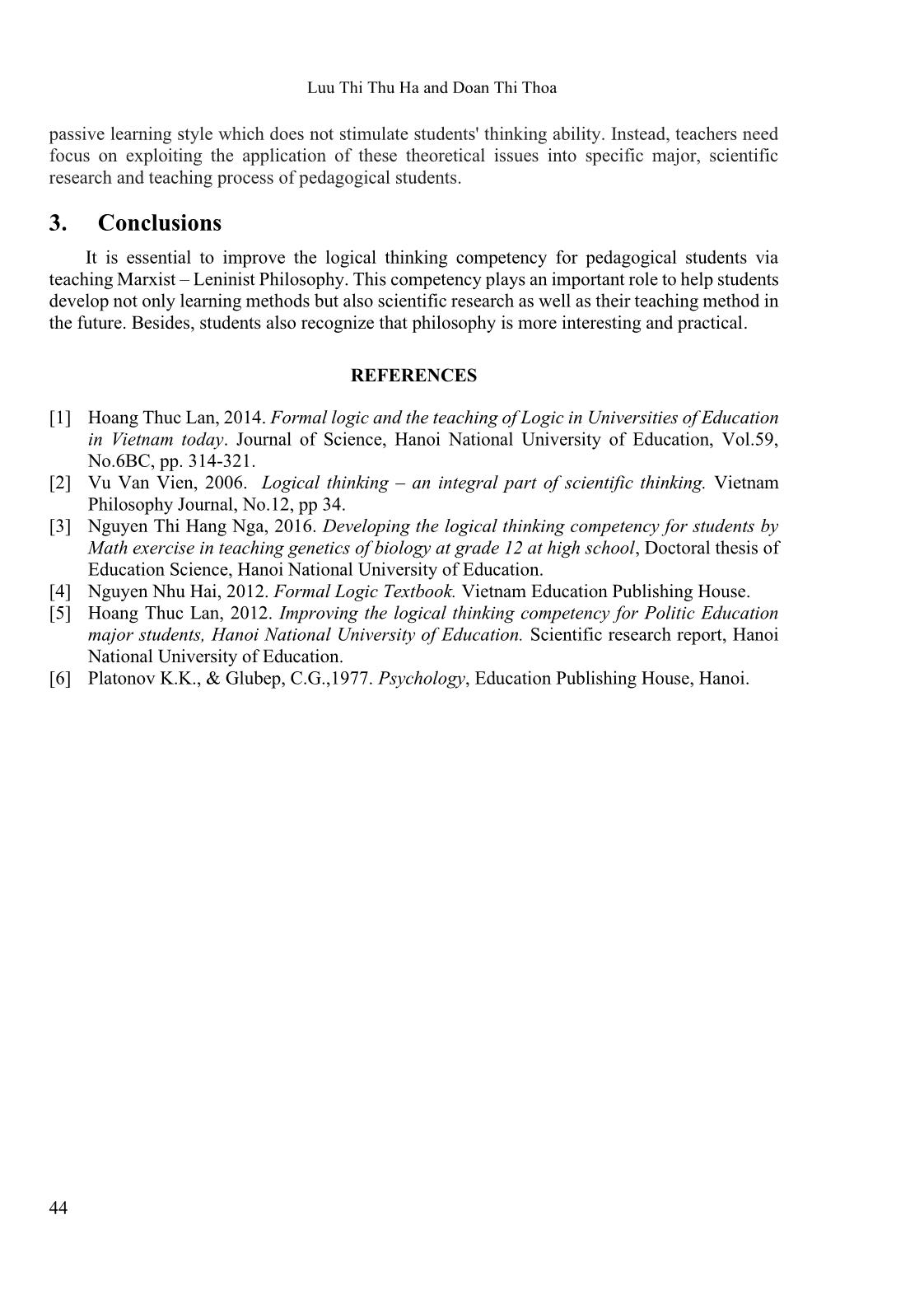
Trang 8
Tóm tắt nội dung tài liệu: Training the logical thinking competency for pedagogical students via teaching Marxist – Leninist philosophy
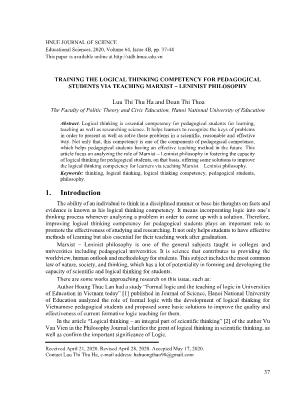
es. Then, they need apply the doctrines, principles, formulas creatively and be avoid dogmatism, experience. When studying an object, evaluating a thought or applying a theory that learners needs identify the relationship with specific conditions and circumstances. The logical thinking ability is the basis for pedagogical students to detect, analyse and solve situations arising in the teaching process. The contradictions arising in the teaching process are the cognitive conflicts. It is the conflict between the students' known knowledge and the need to solve practical situations. It is possible that a student's known knowledge is not enough to solve a situation that arises. Besides, students may have enough knowledge but they can’t connect that knowledge to explain, prove or propose a solution for problem. Training the logical thinking competency for pedagogical students via teaching Marxist – Leninist 41 Armed with the logical thinking ability, pedagogical students can detect and analyse situations and contradictions in the teaching process in a timely, accurate and effective way. They need to be aware that they must guide their pupils to solve these difficult problems. The solution of contradictory situations requires appropriate methods, bringing out gradual suggestions for problems. Moreover, it is necessary that teachers encourage positiveness and attract all students to participate. Logical thinking competency is an essential condition for a teacher to perform the task of training and developing logical thinking for students. One of the common competencies that students need to develop is self-reliance and self- study. The logical thinking competency is one of the important components to contribute to the formation of self-study competency. Students with logical thinking ability can detect, identify and connect ideas to solve learning problems quickly. Since then they had the interest, passion in learning subjects. However, one of the factors that can influence the formation of logical thinking competency for students derives from the teacher's method. This is a unique specific point in pedagogical labor. Through the way of teaching and communicating, teachers not only provide students with knowledge but also provide students with thinking method of learning issues. It is an important thesis that helps explain the students' interest in studying some subjects because the teacher's communication method is easy to understand, coherent and interesting for students. Additionally, some teachers who have one-way communicating method, which make students become passive, sluggish and bored with learning. This also means that the higher the teacher's logical thinking competency, the more likely it will achieve good results in training and developing logical thinking. Furthermore, the reality also shows that high schools today are mainly equipped with the basic sciences but pay little attention to train thinking ability for students. Therefore, when studying at universities or colleges, students in general are weak in thinking ability, especially the logical thinking ability. A lot of students do not know how to relate knowledge in each part, as well as the entire subject, do not know how to move knowledge from one part to the other. Many students have difficulty in explaining, demonstrating or solving problems. Some students do not know how to find many various solutions for exercises or situations. The application of principles and formulas becomes mechanical, not based on each exercise, each topic. They don’t care specific characteristics and requirements to explain, prove, interpret, etc. In other words, students have not identified the dependent relationship and the movement of things, phenomena. 2.3. The role of Marxist – Leninist Philosophy in forming logical thinking competency for pedagogical students Marxist – Leninist philosophy as a general subject, as well as a science of the worldview and methodology will have special potentiality in developing the logical thinking competency for students in learning process at universities. In fact, on every stage of our development, people seek a certain logical and spontaneous philosophy. When a person believes in certain philosophy theory which is his worldview, he also has certain methodology. For example, idealists will have a way of explaining the movement and development of objects and phenomena different from those of materialistic philosophy. Metaphysical thinkers will have different ways of studying the problem than those who follow dialectical thinking. Mastering the Marxist - Leninist philosophy helps each person have the most accurate knowledge of the world from which can form and develop the necessary scientific thinking method for themselves to research specific professional fields. Especially nowadays, the era of Luu Thi Thu Ha and Doan Thi Thoa 42 science and technology, Marxist - Leninist philosophy which is a unity between materialist worldview and dialectical methodology plays a very important role in providing a method of thinking for each person, including students. Because the searching for learning materials and discovering knowledge treasures is no longer a difficult problem, but more importantly the way of exploiting, receiving and using those sources of knowledge Teaching philosophy in universities must equip learners with the correct view of the world and the scientific thinking method so that each person has the problems analyzing skill in real life. Solving all these problems is hard to do. However, the school's training process needs to make the basis for contacting with practice, which helps learners have the best preparation for their occupation and life. Marxist – Leninist philosophy provides students with a way to identify problems. In other words, it helps students initially have the ability to detect problems which is the first important step in forming logical thinking competency. The methodology drawn from the study of the fundamental problem of philosophy "the relationship between matter and consciousness" is to respect objectivity combined with promoting subjective dynamism. Therefore, the perception of phenomena must be true and avoid exaggerating the object in a positive or negative direction. Awareness and improvement must be originated from the things themselves which include their inherent attributes, relationships. This shows that in the process of solving academic tasks or recognizing life problems, students must derive from real data in the topic or real life events. It is impossible to infer things by experience or every individual’s subjective will. For example, in the field of biology, in order to find an effective way to prevent termites, one must learn about the biological properties of termites (including origin, nest structure, uptime and condition for development). Or in literature, in order to analyze and make a view point about a work or a character, we must derive from the analysis of the content itself, the structure, the expression of the work; characteristics of the character, personality of the character but cannot infer the perception of others to shine into. In the political economy, when choosing an economic model for a country, we always have to derive from the level of the productive force. We cannot derive from recognizing the superiority of another economic model and applies it mechanically. It helps us explain why Vietnam chose a multi-component economic structure after 1986 to replace the previous concentrated economic model. Marxist – Leninist philosophy provides students with methods which are helpful for studying, analyzing and evaluating problems. After identifying the problem, it is important to ask questions, form, connect and evaluate ideas. In material dialectic, “the common relationship” principle shows that when studying, considering a specific object, it is necessary to put it in a unified whole of all aspects, parts, elements. As a result, it is necessary to consider this object in relation to other objects and its surroundings, in certain space and time. Thus, after discovering and identifying the problem, students need to identify relevant factors to handle the problem. For example, when analyzing a literary work, we must put it in relation to the social context and ideology when writing the work, with the author's perspective of life to give a comprehensive and insightful evaluating of works. Marxist – Leninist philosophy helps students increase the ability to combine theory with practice in or to solve practical problems Every philosophy theory, including dialectical materialism and historical materialism, provides methodology - a solving problems method in life and study. For example, in cognitive theory, understanding the dialectical path of cognitive process (the process from vivid Training the logical thinking competency for pedagogical students via teaching Marxist – Leninist 43 visualization to abstract thinking, then from abstract thinking to reality) contributes to pedagogical students have a teaching method for high school pupils. Teachers help students synthesize and find their own conceptual knowledge from facts, evidence, real-life situations. Then, students will continue to use the general knowledge gained to explain and provide solutions to other situations that arise in reality. Moreover, presenting philosophical issues always follow a certain logical sequence. It derived from problem identification, problem analysis, linking related structural elements to problem solving, generalize to draw methodological meaning. It means that both the content and form of expressing philosophical issues helps students form and develop logical thinking competency. 2.4. Some solutions to improve logical thinking competency for pedagogical students via teaching Marxist – Leninist philosophy Firstly, it is necessary to use the knowledge of lecture to clarify practical issues related to students' majors. The goal of logical thinking competency is to find actionable solutions for practical problems. Therefore, the program must be practical, systematic, objective, accurate. Besides, contents of subject require students analyze, generalize, abstract. The current Marxist - Leninist Philosophy program is still very theoretical and less practical. This not only decreases the value of the subject, but also makes the training of logical thinking competency less effective. The curriculum needs to show the relationship of philosophical issues with the specialized subjects of students, contributing to solving the basic issues in each major. In addition to the compulsory theory for all subjects, the practical illustrative examples must be attached to each specific major. In each theoretical issue, lecturers should guide students to apply them in their specific specialties such as Math, Physics, Chemistry, Literature, History, etc. For example: applying dialectical relationships between awareness and practice in teaching History to explain why revolutionary strategies changed from time to time. Secondly, teachers need use these logical manipulations in the teaching process In teaching Philosophy, to develop the logical thinking for students, lecturers also need use logical manipulations such as analysis - synthesis, induction - deduction, history - logic, abstraction - specification. For example, abstract logical manipulations “abstraction – specification” means that when teaching Philosophy, lectures can start from the concrete in real life then abstracting and concretizing the content of the lecture. However, the lecturer cannot stop there but to reach the specific thing in thinking which helps students have deeply knowledge about things. For example, from the link in the food chain of animal, lecturers can help students understand the content of the principle of “common relationship”. After that, on basis of understanding common relationship, students need to apply that theory to explain specific issues in other areas such as society and thinking. Thirdly, it is necessary to use forms, teaching methods and teaching techniques to stimulate students' positive and active thinking. Innovating methods of teaching philosophy must encourage students explore, discover and promote the high level of creativity and independence in finding new knowledge. Lecturers should be avoid passive, one-way knowledge acquisition. Lecturers should use positive methods such as case studies method, experimental method, problem-solving method, and discussion method. Especially, it is necessary to use problem-solving method with specialized students for discussing. Fourthly, testing and evaluation methods in teaching Philosophy also need changing. Putting a lot of questions to test awareness at the level of knowing, or in other words, measuring the recall fact and basic concept of students makes the study of philosophy ineffective. Besides, it creates Luu Thi Thu Ha and Doan Thi Thoa 44 passive learning style which does not stimulate students' thinking ability. Instead, teachers need focus on exploiting the application of these theoretical issues into specific major, scientific research and teaching process of pedagogical students. 3. Conclusions It is essential to improve the logical thinking competency for pedagogical students via teaching Marxist – Leninist Philosophy. This competency plays an important role to help students develop not only learning methods but also scientific research as well as their teaching method in the future. Besides, students also recognize that philosophy is more interesting and practical. REFERENCES [1] Hoang Thuc Lan, 2014. Formal logic and the teaching of Logic in Universities of Education in Vietnam today. Journal of Science, Hanoi National University of Education, Vol.59, No.6BC, pp. 314-321. [2] Vu Van Vien, 2006. Logical thinking – an integral part of scientific thinking. Vietnam Philosophy Journal, No.12, pp 34. [3] Nguyen Thi Hang Nga, 2016. Developing the logical thinking competency for students by Math exercise in teaching genetics of biology at grade 12 at high school, Doctoral thesis of Education Science, Hanoi National University of Education. [4] Nguyen Nhu Hai, 2012. Formal Logic Textbook. Vietnam Education Publishing House. [5] Hoang Thuc Lan, 2012. Improving the logical thinking competency for Politic Education major students, Hanoi National University of Education. Scientific research report, Hanoi National University of Education. [6] Platonov K.K., & Glubep, C.G.,1977. Psychology, Education Publishing House, Hanoi.
File đính kèm:
 training_the_logical_thinking_competency_for_pedagogical_stu.pdf
training_the_logical_thinking_competency_for_pedagogical_stu.pdf

